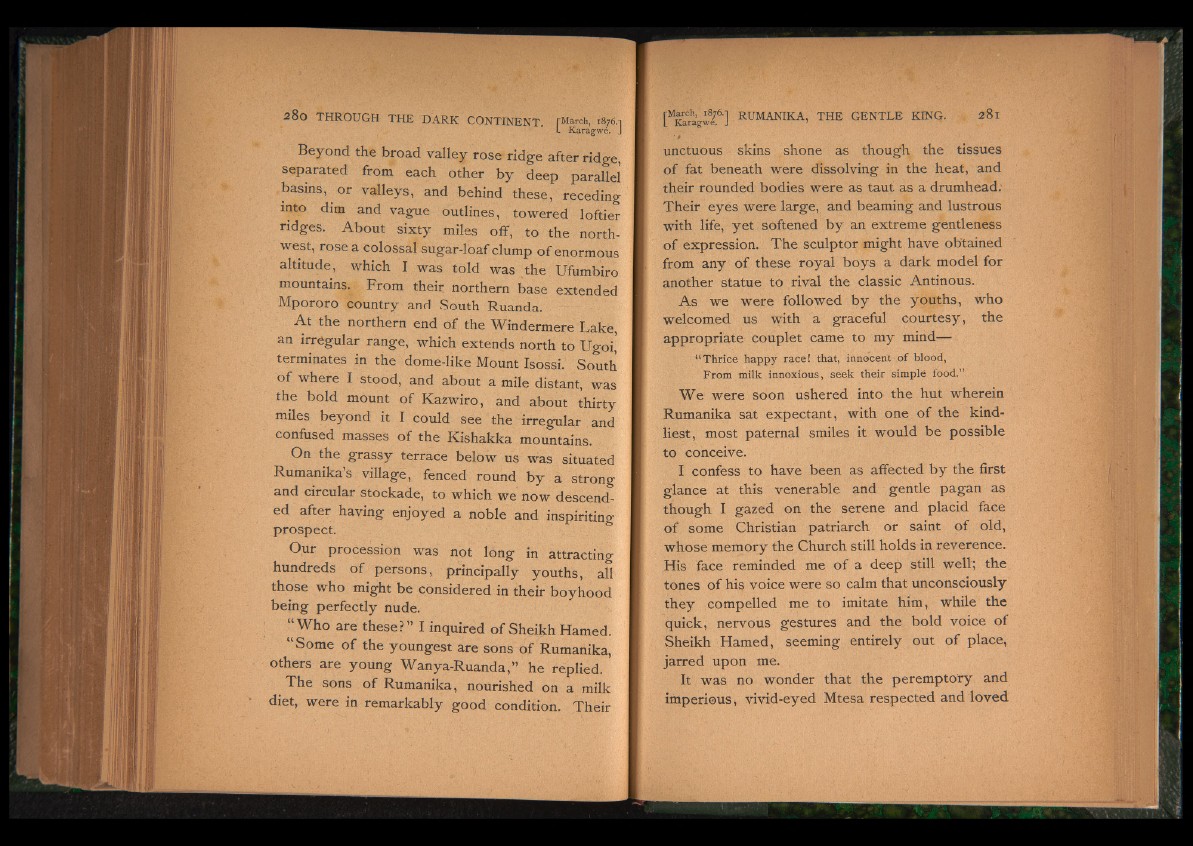
Beyond the broad valley rose ridge after ridge,
separated from each other b y deep parallel
basins, or valleys, and behind these, receding
into dim and vague outlines, towered loftier
ridges. Ab out s ix ty miles off, to the northwest,
rose a colossal sugar-loaf clump o f enormous
altitude, which I was told was the Ufumbiro
mountains. From their northern base extended
Mpororo country and South Ruanda.
A t the northern end o f the Windermere Lake,
an irregular range, which extends north to Ugoi,
terminates in the dome-like Mount Isossi. South
o f where I stood, and about a mile distant, was
the bold mount o f Kazwiro, and about thirty
miles beyond it I could see the irregular and
confused masses o f the Kishakka mountains.
On the grassy terrace below us was situated
Rumanika’s village, fenced round b y a strong
and circular stockade, to which we now descended
after having enjoyed a noble and inspiriting
prospect.
Our procession was not long in attracting
hundreds o f persons, principally youths, all
those who might be considered in their boyhood
being perfectly nude.
‘‘Who are these?” I inquired o f Sheikh Hamed.
“ Some o f the youngest are sons o f Rumanika,
others are young Wanya-Ruanda,” he replied.
The sons o f Rumanika, nourished on a milk
diet, were in remarkably good condition. Their
[March, 1876.-1 RUMANIKA, THE GENTLE KING. 281
L Karagwe. J ’
' ' ' *
unctuous skins shone as though the tissues
o f fat beneath were dissolving in the heat, and
their rounded bodies were as taut as a drumhead.
Their eyes were large, and beaming and lustrous
with life, y e t softened b y an extreme gentleness
of expression. T h e sculptor might have obtained
from any o f these royal boys a dark model for
another statue to rival the classic Antinous.
A s we were followed b y the youths, who
welcomed us with a graceful courtesy, the
appropriate couplet came to my mind—-
“ Thrice happy race! that, innocent of blood,
From milk innoxious, seek their simple food.”
W e were soon ushered into the hut wherein
Rumanika sat expectant, with one o f the kindliest,
most paternal smiles it would be possible
to conceive.
I confess to have been as affected b y the first
glance at this venerable and gentle pagan as
though I gazed on the serene and placid face
o f some Christian patriarch or saint o f old,
whose memory the Church still holds in reverence.
His face reminded me o f a deep still well; the
tones o f his voice were so calm that unconsciously
th ey compelled me to imitate him, while the
quick, nervous gestures and the bold voice of
Sheikh Hamed, seeming entirely out o f place,
jarred upon me.
It was no wonder that the peremptory and
imperious, vivid-eyed Mtesa respected and loved